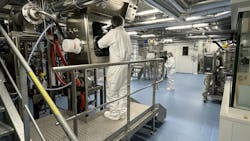Axplora boosts ADC and GLP-1 manufacturing capabilities amid demand for complex APIs
As the demand for complex active pharmaceutical ingredients (APIs) continues to grow, Germany-based contract development and manufacturing organization Axplora is investing in the infrastructure to meet the needs of customers in antibody-drug conjugates (ADCs) and GLP-1 receptor agonists (GLP-1s) — two of the biopharma industry’s hottest areas.
Martin Meeson, the former CEO of Fujifilm Diosynth Biotechnologies who took the helm of Axplora in April 2024, contends that to handle the complexities of API development and manufacturing for such innovative drugs there is a need for high-purity standards and chemical processes, as well as the ability to scale production.
“It’s really about scaling out the things that we are really good at,” Meeson told Pharma Manufacturing. “In ADCs and GLP-1s, we’re scaling in terms of volume and in areas where it’s not as visible, such as skills around the adjacent services like conjugation and the increasing complexity within the synthetic chemistry molecules.”
Formed in 2022 from the integration of PharmaZell, Farmabios, and Novasep CDMO, Axplora operates nine API manufacturing sites in Europe and India. PharmaZell and Farmabios have expertise in APIs, highly potent compounds, and regulatory excellence, while Novasep CDMO’s core competencies are in small molecule and ADC manufacturing.
Axplora has expanded commercial ADC payload production at its Le Mans, France site. The expansion includes a new GMP-compliant payload manufacturing workshop, designed to enhance capacity and meet the industry’s growing demand for ADCs.
“I don’t think people expected the volumes that were needed within the ADCs that we’re now seeing today as an industry,” Meeson said. “So, we’ve invested in a much larger facility in Le Mans to be able to support those larger demands from the customers, both at a clinical stage and commercial stage.”
The expanded Le Mans site — part of the France 2030 national program to encourage the development of biopharmaceuticals in the country — now includes six ADC workshops dedicated to clinical and commercial production, as well as bioconjugation, supported by high-performance chromatography purification lines.
The Le Mans project strengthens Axplora’s position as a global manufacturer supplying 40% of the world’s marketed ADCs and 50% of FDA-approved ADCs, according to the company.
Axplora is also making an investment in GLP-1 manufacturing at its Mourenx, France site. The company says the capital expenditure will solidify its capabilities in peptide purification in biologics and support the development of next-generation therapies, including GLP-1s. Construction and infrastructure development has started, with the first supplies of GLP-1 therapies expected in 2026.
“You maybe wouldn’t think of us in the GLP-1 space,” Meeson acknowledged. “We don’t promote ourselves as a peptide manufacturer but in some of the capabilities we have scale that many CDMOs don’t have. A core expertise of our organization is purification.”
GLP-1s for diabetes and obesity are “really impactful therapies that we’re able to work on,” Meeson said. “We have a co-investment in the purification of a major GLP-1. It just shows how purification is one of the key pillars within the organization. It’s a pillar that underpins the work that we do in ADCs as well.”
With the current geopolitical tensions, shifting trade policies, and potential disruptions in global supply chains, Meeson believes that Axplora is well-positioned when it comes to regional production and localized manufacturing.
“We have some sites in low-cost manufacturing out in India and we have a strong platform of sites across Europe and it’s a very good position to be in,” Meeson said. “We are constantly looking at where things are coming from, where we are single, and where we are double source to make sure that we’re able to continue to supply reliably.”
About the Author
Greg Slabodkin
Editor in Chief
As Editor in Chief, Greg oversees all aspects of planning, managing and producing the content for Pharma Manufacturing’s print magazines, website, digital products, and in-person events, as well as the daily operations of its editorial team.
For more than 20 years, Greg has covered the healthcare, life sciences, and medical device industries for several trade publications. He is the recipient of a Post-Newsweek Business Information Editorial Excellence Award for his news reporting and a Gold Award for Best Case Study from the American Society of Healthcare Publication Editors. In addition, Greg is a Healthcare Fellow from the Society for Advancing Business Editing and Writing.
When not covering the pharma manufacturing industry, he is an avid Buffalo Bills football fan, likes to kayak and plays guitar.
